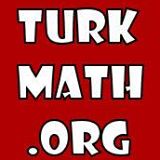Mantık Soruları
1. Express the following sentences in the language of first order predicate logic. If a sentence is ambiguous, try to find a translation for each interpretation.
Example: John hates everybody who loves him.
The sentence has (at least) two logically different readings; the pronoun ‘him’ can either refer to John, or an individual determined by the context of utterance. First we rephrase the sentence according to these readings, so that their logical structure will be revealed:
(a) For every individual x, if x loves John, then John hates x.
(b) For every individual x, if x loves y, then John hates x. (Feel free to skip this step if you are skilled in formalizing.)
Now we introduce symbols that stand for the extralogical terms of the sentence:
– a: John
– xRy: x loves y
– xSy: x hates y
Finally we phrase the translations:
(a) ∀x (xRa → aSx)
(b) ∀x (xRy →aSx)
Exercises:
1. If a man loves Mary, he is desperate.
2. Some, but not all, of her friends know John.
3. It is not the case that everyone knows everyone, but everyone knows someone who knows everyone.
4. Every man hates a woman who hates every man.
5. Exactly one line can be drawn through any point not on a given line parallel to the given line.
2. Give three examples and three counterexamples for each of the following types of relations. The examples can be either from ordinary language or from the terminology of your favourite area:
Examples:
Transitive relation: ∀x ∀y ∀z ((xRy ∧ yRz) →xRz)
Positive examples: ancestor ; less than; is the same age as
Counterexample: friend of ; perpendicular to; different from
Trichotomic relation ∀x ∀y (x = y ∨ xRy ∨ yRx)
Dense relation ∀x ∀y (xRy → ∃z (xRz ∧ zRy))
3. Translate the following sentences containing definite descriptions both in Russell’s and in Frege’s style.
Example: The present king of France is bald.
In Russell’s analysis, the proposition makes three claims: that there is at least one individual that is a present king of France; that there is no other individual that is a present king of France; and that this individual is bald. Let us use P for the predicate ‘present king of France’, and Q for ‘bald’. Thus the logical translation will be
∃x (P x ∧ ¬ ∃x ‘(x ‘≠ x ∧ P x’ ) ∧ Qx)
In Frege’s analysis, the existence and uniqueness claims are not part of the proposition (though they are presupposed in some contexts of utterance). The predicate ‘bald’ applies to the definite description, which is created by the description operator “ιx”. Using the above notation, the translation will be
Q(ιx P x)
Exercises:
1. The winner of the 2018 Cecil B. DeMille Award was born in poverty and might run for president.
2. The South Pole is colder than the North Pole.
3. The person who patented the first modern ballpoint pen was born in Budapest.

 turkmath.org
turkmath.org turkmathviki
turkmathviki